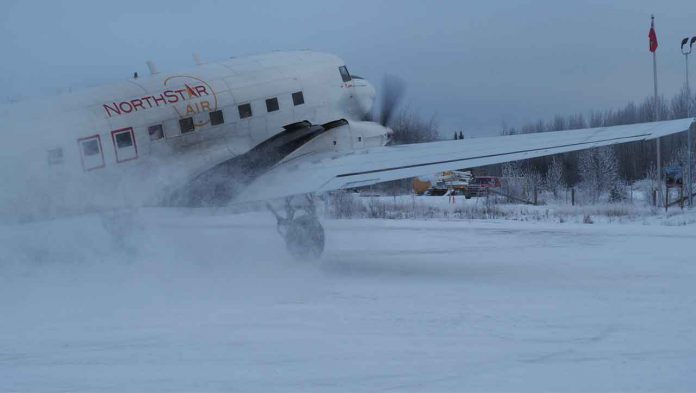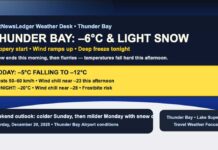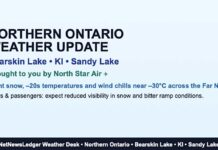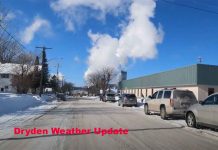The northern communities of Kitchenuhmaykoosib Inninuwug (KI), Bearskin Lake First Nation, Sachigo Lake First Nation, Kasabonika First Nation, and Sandy Lake start the week with a crisp, clear morning with temperatures significantly below freezing.
As observed from Big Trout Lake Airport, the day begins with stark clarity and a biting cold that promises to ease slightly as the sun rises.
Today’s Weather Overview
Current Conditions: As of 4:00 AM CDT, the temperature stands at -10.3°C with a dew point of -15.3°C, indicating very dry air. Humidity is recorded at 67%. A gentle breeze from the south-southwest at 5 km/h contributes to a wind chill of -13°C, making the early hours particularly frosty.
Visibility is slightly reduced at 16 kilometers under clear skies.
Forecast to Wednesday
Expected Conditions: Today, after a clear start, skies will see a mix of sun and cloud. Winds are expected to shift to the north at 20 km/h by late afternoon, with temperatures reaching up to 3°C. However, the morning wind chill will feel like -19°C, so residents should prepare for severe cold. The UV index remains moderate at 4.
Tonight, the sky will turn partly cloudy with a 30% chance of flurries late into the night. Northeastern winds will increase to 30 km/h, gusting to 50 km/h. The low will plummet to -19°C, with a wind chill reaching a frigid -31°C overnight, posing a significant risk of frostbite.
Tuesday will see morning clearing with northeast winds continuing at 30 km/h before becoming lighter. The high will only rise to -7°C, with morning wind chills staying around -31°C and improving to -10°C in the afternoon. The risk of frostbite remains high, and the UV index will again be moderate at 4.
The night will remain clear with temperatures dropping to -15°C.
Wednesday offers a mix of sun and cloud with a more comfortable high of 7°C. However, the night will turn cloudy with a low of -5°C.
Wardrobe Recommendations: Given the extreme cold, particularly in the mornings, residents should wear multiple insulating layers and cover all exposed skin to prevent frostbite. Thermal wear, heavy coats, insulated gloves, and hats are essential. On Tuesday, when temperatures slightly improve, maintaining warm layers will still be necessary.
Weather Trivia: The communities of Kitchenuhmaykoosib Inninuwug and nearby First Nations are situated in a region known for its subarctic climate, where temperature extremes are common, reflecting the resilience of its inhabitants and wildlife.







